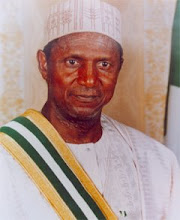Nigeria's president, not seen in public since going into hospital in Saudi Arabia for heart treatment in November, has told the BBC he is recovering.
In his first interview since then, by telephone, Umaru Yar'Adua, 58, said he hoped to make "tremendous progress" and return home to resume his duties.
His long absence and speculation over his health have led to calls for him to hand over power to his vice-president.
A protest in the capital, Abuja, has urged an end to the political limbo.
It is really a great relief to kill the avalanche of rumours of his death
The opposition has been demanding details of Mr Yar'Adua's health amid swirling rumours that he was critically ill - or even dead - and unable to return to power.
His adviser Tanimu Yakubu Kurfi told the BBC the president's enemies were behind the rumours.
Doctors said in December that President Yar'Adua was suffering from acute pericarditis, an inflammation of the lining of the heart. He is also known to have kidney problems.
Constitutional worries
Speaking to the BBC in a three-minute telephone interview organised by the president's office, Mr Yar'Adua said he was making a good recovery.
"At the moment I am undergoing treatment, and I'm getting better from the treatment. I hope that very soon there will be tremendous progress, which will allow me to get back home," he told Mansur Liman from the BBC Hausa service, speaking in both Hausa and English.
BBC Hausa has a large audience in northern Nigeria, where Hausa is the main language.
He said he was in constant contact with Vice-President Goodluck Jonathan, but gave no indication of when he might return to Nigeria.
"I wish, at this stage, to thank all Nigerians for their prayers for my good health, and for their prayers for the nation."
He also wished the Nigerian national football team success in the Africa Cup of Nations currently under way in Angola.
The BBC's correspondent in Nigeria's capital said the president's voice had sounded weak.
President Yar'Adua's silence until now and the fact he did not appoint Vice-President Jonathan to serve in his absence have led to fears of a constitutional crisis.
There is a perceived danger of a power vacuum in a country that only saw the end of military rule just over 10 years ago, the BBC's Will Ross reports from the capital, Abuja.
But analysts say a handover of power before the next scheduled election in 2011 - to Vice-President Jonathan, a southerner, from President Yar'Adua, a northerner - could disrupt the usual rotation between the regions that has governed Nigeria since the return of civilian rule.
There have also been complaints that important government business has been left hanging in the president's absence.


